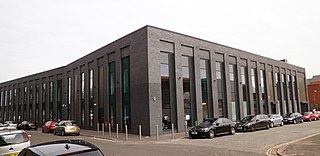
The Admiralty was a department of the Government of the United Kingdom responsible for the command of the Royal Navy until 1964, historically under its titular head, the Lord High Admiral – one of the Great Officers of State. For much of its history, from the early 18th century until its abolition, the role of the Lord High Admiral was almost invariably put "in commission" and exercised by the Lords Commissioner of the Admiralty, who sat on the governing Board of Admiralty, rather than by a single person. The Admiralty was replaced by the Admiralty Board in 1964, as part of the reforms that created the Ministry of Defence and its Navy Department.

The British Council is a British organisation specialising in international cultural and educational opportunities. It works in over 100 countries: promoting a wider knowledge of the United Kingdom and the English language ; encouraging cultural, scientific, technological and educational cooperation with the United Kingdom. The organisation has been called a soft power extension of UK foreign policy, as well as a tool for propaganda.
A hallmark is an official mark or series of marks struck on items made of metal, mostly to certify the content of noble metals—such as platinum, gold, silver and in some nations, palladium. In a more general sense, the term hallmark can also be used to refer to any distinguishing mark.
Chris-Craft Industries, Inc., formerly National Automotive Fibers, Inc., was a publicly held American corporation that was traded on the New York and Pacific Stock Exchanges. In 1962, the company adopted the name of one of its acquisitions, Chris-Craft Boats, which was founded in the late 19th century and became famous for mahogany-hulled powerboats in the 1920s through the 1950s. Chris-Craft Industries also went into broadcasting, owning television stations via its subsidiary BHC Communications and co-founding the UPN TV network.
Assay offices are institutions set up to assay precious metals. This is often done to protect consumers from buying fake items. Upon successful completion of an assay the assay offices typically stamp a hallmark on the item to certify its metallurgical content. Hallmarking first appeared in France, with the Goldsmiths' Statute of 1260 promulgated under Étienne Boileau, Provost of Paris, for King Louis IX.

The British Hillclimb Championship (BHC) is the most prestigious hillclimbing championship in Great Britain. The British Hill Climb Championship was held every year from 1947 to 2019, and resumed in 2021. The 2020 season was cancelled due to the COVID-19 pandemic.

Vancouver City Council is the governing body of Vancouver, British Columbia. The council consists of a mayor and ten councillors elected to serve a four-year term. Monthly, a deputy mayor is appointed from among the councillors. The current mayor is Ken Sim, who leads the party ABC Vancouver. City council meetings are held in Vancouver City Hall. The most recent election was on October 15, 2022.

British Hovercraft Corporation (BHC) was a British hovercraft manufacturer that designed and produced multiple types of vehicles for both commercial and civil purposes.

Government Buildings is a large Edwardian building enclosing a quadrangle on Merrion Street in Dublin, Ireland, in which several key offices of the Government of Ireland are located. Among the offices of State located in the building are:

The Birmingham Assay Office, one of the four assay offices in the United Kingdom, is located in the Jewellery Quarter, Birmingham. The development of a silver industry in 18th century Birmingham was hampered by the legal requirement that items of solid silver be assayed, and the nearest Assay Offices were in Chester and London. Matthew Boulton and Birmingham's other great industrialists joined forces with silversmiths of Sheffield to petition Parliament for the establishment of Assay Offices in their respective cities. In spite of determined opposition by London silversmiths, an Act of Parliament was passed in March 1773, just one month after the original petition was presented to Parliament, to allow Birmingham and Sheffield the right to assay silver. The Birmingham Assay Office opened on 31 August 1773 and initially operated from three rooms in the King's Head Inn on New Street employing only four staff and was only operating on a Tuesday. The first customer on that day was Matthew Boulton.
Sir Adam Courtauld Butler was a British Conservative Party politician, serving as an MP for 17 years and holding several junior ministerial offices.

The Hallmarking Act 1973 makes up the bulk of modern law regarding the assaying and hallmarking of metals in the United Kingdom. Hallmarking is a way to guarantee the purity of precious metals. Metals are tested and, if they meet a certain minimal purity requirement, are marked with a specified seal. In the United Kingdom, this is done by the assay offices in London, Birmingham, Sheffield, and Edinburgh. The act made business transactions involving unmarked metals illegal. Trading Standards departments are responsible for enforcing the act.

The Balochistan High Court is the highest judicial institution of Balochistan, Pakistan. The court is formally known as the High Court of Balochistan. It is situated in the provincial capital, Quetta.

A silver object that is to be sold commercially is, in most countries, stamped with one or more silver hallmarks indicating the purity of the silver, the mark of the manufacturer or silversmith, and other (optional) markings to indicate date of manufacture and additional information about the piece. In some countries, the testing of silver objects and marking of purity is controlled by a national assayer's office.

The British Hovercraft Corporation AP1-88 is a medium-size hovercraft. In a civil configuration, the hovercraft can seat a maximum of 101 passengers, while as a troop carrier, it can transport up to 90 troops. When operated as a military logistics vehicle, the AP1-88 can carry a pair of Land Rovers, a Bv202 tracked vehicle and trailer unit or up to roughly 10 tons (10,000 kg) of cargo.
Westminster House, the official residence in Colombo for the British High Commissioner in Sri Lanka, is situated in Cinnamon Gardens, a suburb of Colombo.

The High Commission of the United Kingdom in New Delhi is the diplomatic mission of the United Kingdom in India. It is located at Shantipath in Chanakyapuri.

Trout Brook Valley State Park Reserve is a 300-acre (120 ha) parcel owned by the state of Connecticut that is part of the larger Trout Brook Valley Preserve, located in Easton, Connecticut. The full conservation area covers 1,009 acres (408 ha) and comprises several contiguous parcels in the towns of Easton and Weston, bordering the southeast corner of the Saugatuck Reservoir. It is managed by the Aspetuck Land Trust. The state park portion of the preserve offers opportunities for hiking and hunting.

The Broken Hill Complex, an interim Australian bioregion, is located in both New South Wales and South Australia, and comprises an area of 5,635,422 hectares of inland Australia.
The British High Commission Kampala is the diplomatic mission of the Government of the United Kingdom to Uganda, representing the United Kingdom and the United Kingdom's interests. It is located on Windsor Loop in the Kampala suburb of Kamwokya. The current British High Commissioner is Kate Airey who was appointed at the end of 2019, and started in November 2020.














